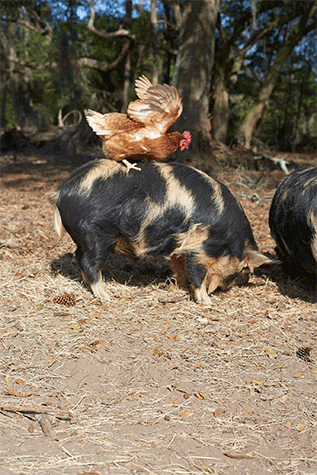
Best Hobby Farm Animals: Ideas to Grow Your Backyard Farm
Starting a Flock : Hobby Farming
Chickens are often the gateway animal to the hobby farm of your dreams. Maybe you start with a few cute baby chicks, but before you know it, your backyard will look like Old McDonald’s farm!
Introducing new animals is a big, but exciting step. Identifying your goals and available resources such as time, facilities, pasture and money can help make the transition a smooth one. Here are some hobby farming ideas to consider when choosing new additions to your brood.
Game birds like peacocks, quail and pheasants can be a fun, unique addition to your hobby farm. They can provide fresh eggs, meat, colorful feathers and companionship. They can also be raised for release programs. Game birds do best when provided with a spacious coop and plenty of room in an enclosed outdoor space.
The biggest challenge is learning how to build a goat pen your new companions can’t escape. Chain link fence, woven wire or hog panels set at ground level can work nicely. Plan for a minimum of 15-by-15 feet of space per pair of goats. The more space for them to move, the better for their overall health and well-being. Don’t forget to include items for goats to climb or jump from – it will not only provide entertainment for the goats, but for you as well.
It’s also a common misconception that goats will eat anything; quality nutrition is vital. Each day, goats need to eat 3% of their body weight in forage, such as hay or grass, and will require high-fiber, low-energy goat feed and free-choice loose mineral.
The same considerations for goats hold true for sheep when it comes to fencing, space and nutrition needs. The big difference is sheep are sensitive to copper. If you house sheep with goats or cattle, make sure the mineral you feed is low in copper so they won’t have any issues.
Calves can also start receiving a handful of starter feed at three days old and gradually eat more as they grow. By 12 weeks old, calves should be eating approximately 3 pounds of starter per day and can be weaned.
Once they’re weaned, calves need more space and can be turned out to pasture for grazing. Adding in a protein and mineral source can help provide a balanced diet, as well as supplementing with cut hay.
Fencing and shelter don’t have to be complicated, either. A single strand of electric fence will keep in most cattle that have grown accustomed to it, or you can put up several strands of barbed wire. A three-sided shed is plenty of shelter since cattle are meant to be outside. At the very least, make sure they can get under some shade during the summer and trees can provide enough retreat from the heat.
Whether your equine of choice is a horse, miniature horse, pony or donkey, they all need protein, vitamins and minerals. Forage is the first place to start with pasture grass and/or hay. Horses, minis and ponies need at least 1-1.5 pounds of hay or pasture grass per 100 pounds of body weight every day. Then, to further supplement your equine friends, a pelleted feed, including grains and other ingredients such as alfalfa and beet pulp, is a good way to balance the diet.
There are a variety of housing options for rabbits. The types of rabbit housing aren’t important, as long as they provide protection from predators. The shelter should also have ample shade and ventilation, as extreme heat can be problematic. Raising pigs can be an excellent project for a family. They’re remarkably smart and personable and provide companionship or delicious pork. Unlike other farm animals, pigs don’t do well with leashes or collars, so be prepared with tools like sorting boards or rattle paddles to guide your pig. Pigs are fast learners, and these tools work best when you work with them daily and they are comfortable around you.
Raising pigs can be an excellent project for a family. They’re remarkably smart and personable and provide companionship or delicious pork. Unlike other farm animals, pigs don’t do well with leashes or collars, so be prepared with tools like sorting boards or rattle paddles to guide your pig. Pigs are fast learners, and these tools work best when you work with them daily and they are comfortable around you.
Small, frequent meals keep pigs feeling satisfied and comfortable. Self-feeders are a good option so pigs can eat on demand and automatic nipple waterers ensure a steady flow of water with minimal waste.
One warning: pigs create a lot of manure. Plan to compost their waste, including manure, bedding and feed, or find a commercial composter to take it.
Growing your hobby farm is an exciting time, and being prepared will make the process more enjoyable for you and your animals.
Introducing new animals is a big, but exciting step. Identifying your goals and available resources such as time, facilities, pasture and money can help make the transition a smooth one. Here are some hobby farming ideas to consider when choosing new additions to your brood.
Turkeys, ducks, geese and more!
If you’re already a backyard chicken enthusiast, adding different poultry species may be for you! Turkeys produce great-tasting eggs and meat. They require a spacious outdoor area with predator-proof fencing. Ducks and geese make wonderful companion animals and help control insects and weeds while providing you with delicious eggs. They are happiest in a grassy area, and while not required, they enjoy a swimming pond or pool. Turkeys, ducks and geese are a great way to start if you’re looking for new hobby farming ideas.Game birds like peacocks, quail and pheasants can be a fun, unique addition to your hobby farm. They can provide fresh eggs, meat, colorful feathers and companionship. They can also be raised for release programs. Game birds do best when provided with a spacious coop and plenty of room in an enclosed outdoor space.
Have fun with backyard goats
Want to expand beyond birds? Goats are curious, playful and social animals – you can’t just have one! In addition to the daily entertainment, they can provide many great products your family can use like milk, cheese and soap.The biggest challenge is learning how to build a goat pen your new companions can’t escape. Chain link fence, woven wire or hog panels set at ground level can work nicely. Plan for a minimum of 15-by-15 feet of space per pair of goats. The more space for them to move, the better for their overall health and well-being. Don’t forget to include items for goats to climb or jump from – it will not only provide entertainment for the goats, but for you as well.
It’s also a common misconception that goats will eat anything; quality nutrition is vital. Each day, goats need to eat 3% of their body weight in forage, such as hay or grass, and will require high-fiber, low-energy goat feed and free-choice loose mineral.
Satisfaction from keeping sheep
Another hooved backyard animal that has a lot of similarities to goats are sheep. Not only can you raise some breeds of sheep for milk, but you can also get wool that can be turned into clothing.The same considerations for goats hold true for sheep when it comes to fencing, space and nutrition needs. The big difference is sheep are sensitive to copper. If you house sheep with goats or cattle, make sure the mineral you feed is low in copper so they won’t have any issues.
Raise cattle easily
If you’d like to have some larger animals, consider getting cattle. Baby calves are a great place to start. Feed young calves 8-12 quarts of milk replacer per day with a bottle or bucket, split equally between two or three feedings.Calves can also start receiving a handful of starter feed at three days old and gradually eat more as they grow. By 12 weeks old, calves should be eating approximately 3 pounds of starter per day and can be weaned.
Once they’re weaned, calves need more space and can be turned out to pasture for grazing. Adding in a protein and mineral source can help provide a balanced diet, as well as supplementing with cut hay.
Fencing and shelter don’t have to be complicated, either. A single strand of electric fence will keep in most cattle that have grown accustomed to it, or you can put up several strands of barbed wire. A three-sided shed is plenty of shelter since cattle are meant to be outside. At the very least, make sure they can get under some shade during the summer and trees can provide enough retreat from the heat.
Horsing around the backyard
A familiar sight on many backyard farms is a horse. You can use horses for a variety of reasons, such as trail riding, rodeoing, competitive showing, therapy riding and more. Horses also make great companions and, with proper care, can live the longest out of most hobby farm animals at 20 years or more.Whether your equine of choice is a horse, miniature horse, pony or donkey, they all need protein, vitamins and minerals. Forage is the first place to start with pasture grass and/or hay. Horses, minis and ponies need at least 1-1.5 pounds of hay or pasture grass per 100 pounds of body weight every day. Then, to further supplement your equine friends, a pelleted feed, including grains and other ingredients such as alfalfa and beet pulp, is a good way to balance the diet.
The pros of having rabbits
Backyard rabbits don’t require much time, space or money to raise but serve many purposes. They’re great for pets, 4-H projects, wool or meat. Some pros of having rabbits: rabbit manure is the garden gold of fertilizer. Rabbit droppings don’t require composting, break down slowly over time and help improve soil stability.There are a variety of housing options for rabbits. The types of rabbit housing aren’t important, as long as they provide protection from predators. The shelter should also have ample shade and ventilation, as extreme heat can be problematic.
Learn a lot by raising pigs
 Raising pigs can be an excellent project for a family. They’re remarkably smart and personable and provide companionship or delicious pork. Unlike other farm animals, pigs don’t do well with leashes or collars, so be prepared with tools like sorting boards or rattle paddles to guide your pig. Pigs are fast learners, and these tools work best when you work with them daily and they are comfortable around you.
Raising pigs can be an excellent project for a family. They’re remarkably smart and personable and provide companionship or delicious pork. Unlike other farm animals, pigs don’t do well with leashes or collars, so be prepared with tools like sorting boards or rattle paddles to guide your pig. Pigs are fast learners, and these tools work best when you work with them daily and they are comfortable around you.Small, frequent meals keep pigs feeling satisfied and comfortable. Self-feeders are a good option so pigs can eat on demand and automatic nipple waterers ensure a steady flow of water with minimal waste.
One warning: pigs create a lot of manure. Plan to compost their waste, including manure, bedding and feed, or find a commercial composter to take it.
Growing your hobby farm is an exciting time, and being prepared will make the process more enjoyable for you and your animals.



